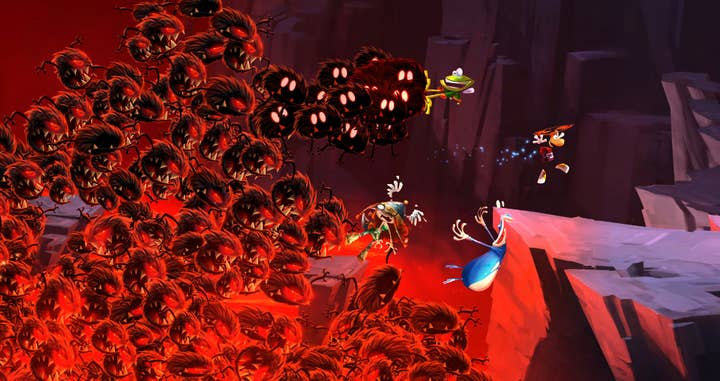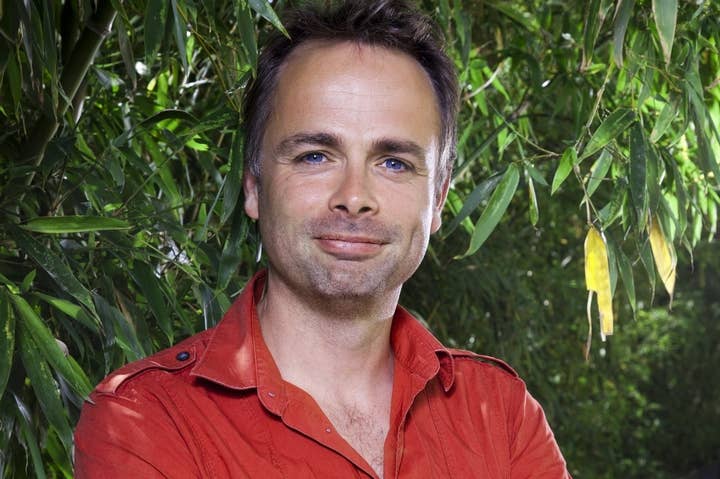Michel Ancel: Connect, Share, Create
The veteran developer shares his thoughts on the definitive trends of the next generation, and the vital importance of connected play
As the industry looks towards the next generation of consoles, it's important to remember the gulf between practice and potential. The press conferences held by Sony and Microsoft to promote their hardware were drenched in talk of 'new experiences', even as precise details of the ways in which these games would feel substantially different failed to appear. Hardware specs can only carry a console so far. After that, it's all about creativity.
The question of what developers can achieve with these new consoles has been playing on the mind of Michel Ancel, the celebrated creator of Rayman and Beyond Good & Evil, and creative director at Ubisoft Montpellier. Indeed, it is one of the driving ideas behind his talk at Barcelona's Gamelab conference ("Building An Emotional Experience" - see the video embedded below) and it will surprise nobody that very few of Ancel's conclusions involve photo-realism and prettier explosions.
"The players see the pattern. They know that there will be no action or something unexpected because the game wants them to look at a scripted event. They feel it too much"
When Ancel talks about "emotion" it is in a very different context to that employed by studios like Quantic Dream, Bioware and Naughty Dog. Ancel doesn't mention any game or studio specifically, but it's clear that what he wants to accomplish has little to do with the cinematic trappings evident in so many games with a transparently "emotional" agenda. It is the difference between the experience of a game like Journey and a game like The Last Of Us - one spontaneous, the other prescribed.
"When you're making a game, it could be compared to a guy organising a party," Ancel says when we meet after his talk. "You don't want them to be exactly the way you tell them to behave. You want them to be in a contextual environment where they can enjoy themselves, and [enjoy] being with each other.
"The old fashion of making games was, 'this is my main scenario, I want people to get this and that, and see that scripted event, and blah, blah, blah, blah.' We know quite well how to make [those] games now, and that wasn't the case 20 years ago; only the Japanese guys were very good at making games."
This base of technique and knowledge has been in place for some time, and Ancel suggests that the mainstream industry is often too comfortable simply repeating those same, established formulas; another first-person shooter, another platformer, another racing game, without ever pushing on the limits of any particular form, or the medium as a whole. The challenge presented by the next generation of hardware is to somehow break this pattern, because, in Ancel's view, gamers may soon tire of playing through the same tropes.

"Now, the players see the pattern," he says. "They know that there will be no action or something unexpected because the game wants them to look at a scripted event, or there's a [disguised] tutorial, or whatever. They feel it. They feel the pattern too much. I want them to feel something organic, where they really have to behave dynamically and find solutions in a more challenging environment.
"When we make games we really want people to surprise us. The best reward is to see the community sharing an experience that you couldn't expect them to have. We want to go in this direction, because it's really exciting. It's less self-involved... It's about letting people have their own experience, but if that experience is what I call 'sports' - like shooting, running, counting [the number of] deaths, performance, optimisation; all of these things, this is all sports."
"Technically, it will be very difficult to be offline... It's not a trend, and that's really because there are benefits to it"
Ancel talks about "extending the radius of inteactivity" beyond the typical verbs associated with video games: run, shoot, crouch, jump, punch, climb, accelerate, and so on. The context in which these actions take place is one possible area for innovation - the way that the violence in The Last Of Us feels different to other, mechanically similar games, for example - but for Ancel the most obvious destination for progressive developers is the more social environment of connected gaming.
"Don't talk about AI and things like that," Ancel advises. The variety and dynamism required to create a broader and more meaningful palette of interactions already exists in the connected audience. This generation has illustrated how powerful an effect real people communicating and cooperating can have on the experience of playing a game - an obvious example is Minecraft, but even action titles like Left 4 Dead and Battlefield 3 were immeasurably enriched by the interplay between friends and the focus on group-play - but for Ancel the industry has only dabbled in the ocean of potential opportunity the connected world offers.
"Through the game design, you can create communication and the necessity to co-operate," he says. "And I think that can be extended to games that you don't just play for 10 minutes or 15 minutes, but much longer experiences, where you really have a strategy together. You're not always in the same place, and you need to co-ordinate with the other people. It's what you see in MMOs. Things are moving in that direction, and it's getting more and more interesting."
That broad push towards more connected play experiences was certainly evident at E3, where a number of the most celebrated games were based around group-play in persistent, dynamic environments: Bungie's Destiny is an obvious example, but The Crew and Tom Clancy's The Division - both from Ubisoft, Ancel's employer - are also being built around these values. In terms of game design and the user experience, Ancel believes the proliferation of persistent worlds will be a huge benefit of the new consoles.
"When you play a game you spend your time in it. If there's some persistence, some socialising, you're investing your time in the game," he says. "Persistence and social are there to make sure the player is investing their time, and making their knowledge about the game more valuable... It is interesting to not just reboot everything as the way it was before. Connecting things gives players a more important world."
Microsoft's gross mishandling of its now-defunct online policies have cast a negative light over the concept of console experiences that rely on an internet connection, but there is more to the issue than invasive DRM. For Ancel, the benefits of connected games are "already important" from a creative standpoint, and while he believes that it's still necessary to create games that function offline, he is frank about the difficulties that gamers without stable broadband access will face with Xbox One and PlayStation 4. Online is likely to be as definitive in the next generation as HD and motion-controls were in this one.
"Microsoft went a bit too fast. It was too brutal, maybe, especially with the gamers... But in some ways they realised that the connection is going to be the meaning"
"Technically, it will be very difficult to be offline," he says. "It's not a trend, and that's really because there are benefits to it. When we're with friends, we are used to talking about what happens during the day. The success of Facebook is really because we are living stories every day, and it lets us share them. Now we can do that in games, and share virtual stories in real-time. Things like the [PlayStation 4's] share button are just natural. It's really essential to have this socialisation and sharing."
One of the important issues raised by the fallout from the Xbox One's online check-ins and disc-less ecosystem was the actual readiness of the gaming public for the seemingly inevitable switch to online. Many feared that the demands of the Xbox One would prove too much for the speed and stability of their internet connections; demands concocted by ivory-tower dwelling executives, knee-deep in unused bandwidth. Yet games like The Division or Destiny will be just as reliant on the internet, and that is a reflection of where the industry's most prominent creative minds need to go in order to innovate.
"We think about that a lot at Ubisoft - because we have a lot of big, AAA games that are hero-based - and we think that the transition must be smooth," he says. "I think what happened with the Xbox One, [Microsoft] are in the trend. What they wanted to do was a business trend, I would say, and they went a bit too fast. It was too brutal, maybe, especially with the gamers.
"But in some ways they realised that the connection is going to be the meaning [of the next generation]. You will want to want to use your console to be connected. Even now, with a phone, if the internet is not working you're like, 'it's useless'. [Microsoft] knows that consoles are going to be like that, but they did too many things at the same time.
"Don't force them to do it. Make something so good that they want to be connected. That's the difference. Make people, in a positive way, go in the direction you want."
For more videos from the speakers at Gamelab 2013, including talks from Mark Cerny and Patrice Desilets, visit the Gamelab Vimeo channel.

